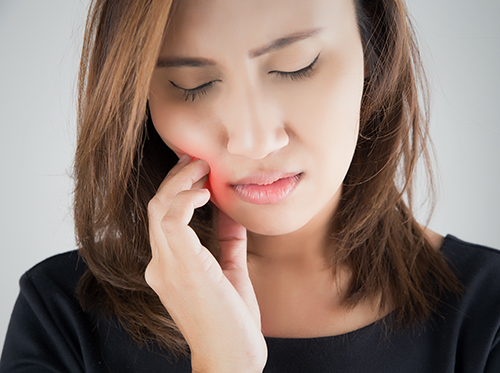
We’re all friends here, so if you sometimes feel a bit nervous before your dental appointment, no judging! Ask us about any worries you might have. We are happy to explain procedures, equipment, and sedation options so you know just how safe and comfortable your experience can be. And if X-rays are a concern, we can put your mind at ease here as well.
What Exactly Are X-rays?
Sometimes patients feel reluctant about the process of imaging because X-rays are a kind of radiation. But the fact is, radiation is all around us. We are exposed to radiation naturally from our soil and water, sun and air, as well as from modern inventions such as cell phones, Wi-Fi, and air travel.
Why is radiation so common? Because matter throughout the universe constantly gives off energy, and the energy that is emitted is termed radiation. This radiation takes two forms—as particles (which we don’t need to consider!) and as traveling rays. This second type is known as electromagnetic radiation, created by photons traveling in regular waves at the speed of light.
We are exposed to electromagnetic radiation every day, because, whether we can see them or not, these different wavelengths and frequencies create various forms of light. Radio waves, microwaves, infrared, visible, and ultraviolet light, X-rays, and gamma rays are all part of the electromagnetic light spectrum.
Different types of radiation on this spectrum have different wavelengths and different frequencies, and produce different amounts of energy. Longer wavelengths mean lower frequencies and less energy. Because X-rays have shorter wavelengths and higher frequencies than, for example, radio waves and visible light, they have more energy.
How Do Dental X-rays Work?
An X-ray machine produces a very narrow beam of X-ray photons. This beam passes through the body and captures images of our teeth and jaws on special film or digital sensors inside the mouth (intraoral X-rays), or on film or sensors located outside the mouth (extraoral X-rays). These X-ray images are also known as radiographs.
Why are X-rays able to take pictures inside our bodies? Remember that higher energy we talked about earlier? This energy enables X-rays to pass through the softer, less dense parts of our bodies, which are seen as gray background in a radiograph. But some substances in our bodies absorb X-rays, such as the calcium found in our bones and teeth. This is why they show up as sharp white images in radiographs.
There are different types of common dental X-rays which are used for a number of reasons:
- Bitewing X-rays, which are used to check on the health of the back teeth.
- Periapical X-rays, which allow us to look at one or two specific teeth from crown to root.
- Occlusal X-rays, which show the entire arch of teeth in the upper or lower jaw.
- Panoramic X-rays, which use a special machine to rotate around the head to create a complete two-dimensional picture of teeth and jaws.
- Cone Beam Computed Tomography, an external device which uses digital images to create a three-dimensional picture of the teeth and jaws.
Why Do We Need X-rays?
If all of our dental conditions were visible on the surface, there would be no need for X-rays. But there are many conditions that can only be discovered with the use of imaging—infection, decay, a decrease in bone density, or injuries, for example, can show up as darker areas in the teeth or jaws. Among their many diagnostic uses, X-rays can help us find:
- Cavities between teeth or under old fillings
- Damage to the tooth’s pulp which might require root canal treatment
- Injuries to teeth or roots after trauma
- Abscesses, tumors, or other conditions that might be causing swelling or pain
- Position and development of wisdom teeth
- Ideal placement for implants
- Health and density of the jaw and alveolar bone
X-rays can also serve an important preventative role, by discovering small problems before they become major ones.
How Do Dentists Make Sure Your X-rays Are As Safe As They Can Be?
First of all, the amount of radiation you are exposed to with a dental X-ray is very small. In fact, a set of bitewing X-rays exposes us to slightly less than the amount of radiation we are exposed to through our natural surroundings in just one day. Even so, Dr. Kelly Peterson and our team are committed to making sure patients are exposed to as little radiation as possible.
Radiologists, the physicians who specialize in imaging procedures and diagnoses, recommend that all dentists and doctors follow the safety principal known as ALARA: “As Low As Reasonably Achievable.” This means using the lowest X-ray exposure necessary to achieve precise diagnostic results for all dental and medical patients.
The guidelines recommended for X-rays and other imaging have been designed to make sure all patients have the safest experience possible whenever they visit the dentist or the doctor. We ensure that imaging is safe and effective in a number of ways:
- We take X-rays only when they are necessary.
- We provide protective gear, such as apron shields and thyroid collars, whenever needed.
- We make use of modern X-ray equipment, for both traditional X-rays and digital X-rays, which exposes patients to a lower amount of radiation than ever before.
- When treating children, we set exposure times based on each child’s size and age.
And now that we’ve talked about some things you might like to know,
Please Let Us Know If . . .
- You’re a new patient, with previous X-rays taken during regular exams or for specific procedures. Ask to have your older X-rays sent to our office. With digital X-ray technology, this transfer can be accomplished with e-mail! Having your dental history available lets us notice any changes that have taken place.
- You’re pregnant, or think you might be pregnant. Even though radiation exposure is very low with dental radiographs, unless there is a dental emergency, dentists and doctors recommend against X-rays for pregnant patients.
X-rays play an important part in helping us make sure your teeth stay their healthiest. If you have any concerns, contact our Marysville, WA office. When it comes to making sure you’re comfortable with all of our procedures, including any X-rays that might be necessary, we’re happy to give you all the inside information!










 Website Powered by Sesame 24-7™
Website Powered by Sesame 24-7™